Collaborative Leadership--Reading Guide Chapters 7-8
- 格式:doc
- 大小:23.00 KB
- 文档页数:3
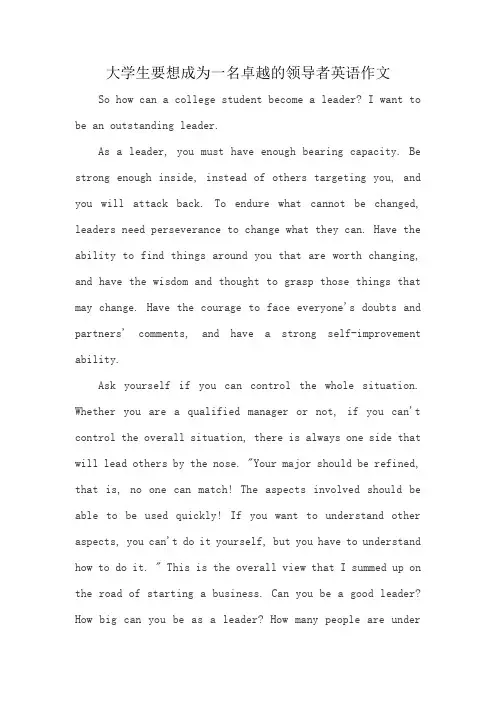
大学生要想成为一名卓越的领导者英语作文So how can a college student become a leader? I want to be an outstanding leader.As a leader, you must have enough bearing capacity. Be strong enough inside, instead of others targeting you, and you will attack back. To endure what cannot be changed, leaders need perseverance to change what they can. Have the ability to find things around you that are worth changing, and have the wisdom and thought to grasp those things that may change. Have the courage to face everyone's doubts and partners' comments, and have a strong self-improvement ability.Ask yourself if you can control the whole situation. Whether you are a qualified manager or not, if you can't control the overall situation, there is always one side that will lead others by the nose. "Your major should be refined, that is, no one can match! The aspects involved should be able to be used quickly! If you want to understand other aspects, you can't do it yourself, but you have to understand how to do it. " This is the overall view that I summed up on the road of starting a business. Can you be a good leader? How big can you be as a leader? How many people are underyour command? Can you assign them well? That is to say, if you can't manage a team of several people well, then you don't have leadership at all.When the leader is a human being, be a human being in advance. No matter how powerful a group is, all listed companies are made by people. The reason why I say I'm on the road to starting a business is that I met the wrong person, and I met him several times. But if you meet a good team, a good leader must know how to respect every member of the team. Try to create a good environment and demand for them. This demand is the driving force. Why is Google famous all over the world? Let's see if Google members are free.A new entrepreneurial team, how they do, is not my decision! They can succeed or fail without my words. At least, the leader of this team must meet the above requirements in order to make an appearance.。

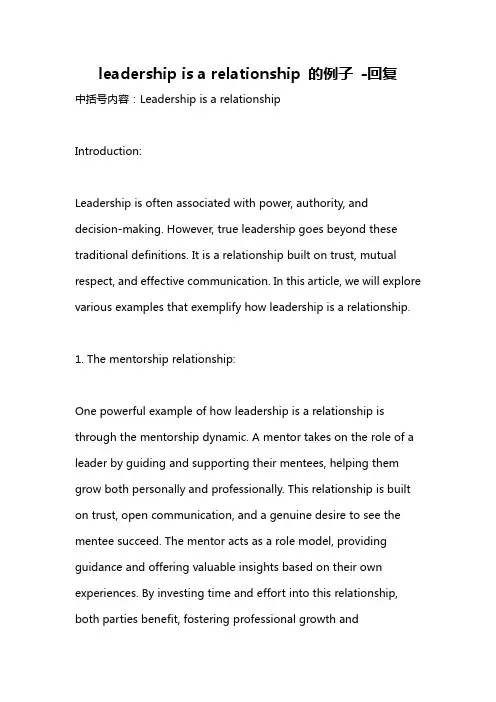
leadership is a relationship 的例子-回复中括号内容:Leadership is a relationshipIntroduction:Leadership is often associated with power, authority, and decision-making. However, true leadership goes beyond these traditional definitions. It is a relationship built on trust, mutual respect, and effective communication. In this article, we will explore various examples that exemplify how leadership is a relationship.1. The mentorship relationship:One powerful example of how leadership is a relationship is through the mentorship dynamic. A mentor takes on the role of a leader by guiding and supporting their mentees, helping them grow both personally and professionally. This relationship is built on trust, open communication, and a genuine desire to see the mentee succeed. The mentor acts as a role model, providing guidance and offering valuable insights based on their own experiences. By investing time and effort into this relationship, both parties benefit, fostering professional growth anddevelopment.2. Leading by example:Another example of leadership as a relationship can be seen in the concept of leading by example. A leader who leads by example sets high standards for themselves and consistently demonstrates the behaviors they expect from their team. This relationship is built on trust and respect, as the team members look up to their leader and are inspired by their actions. This form of leadership encourages accountability and creates a positive work environment where individuals are motivated to perform at their best. By modeling the desired behaviors, a leader establishes a strong relationship that fosters growth and success within the team.3. Collaborative decision-making:Leadership as a relationship can also be observed in the context of collaborative decision-making. Instead of imposing decisions from the top-down, a leader who values the input and expertise of their team encourages a participatory approach. This relationship is built on effective communication and trust, as team members feelvalued and empowered to contribute. The leader creates a safe space for open dialogue, where diverse perspectives are considered before making a decision. Through this collaborative process, the leader strengthens the relationship with their team, resulting in collective ownership of decisions and improved outcomes.4. Building a positive organizational culture:Leadership as a relationship is vital in shaping the culture of an organization. A leader who prioritizes relationships and invests in their team fosters a positive work environment where individuals feel valued and supported. This relationship is built on trust, respect, and effective communication. By creating a culture of openness and collaboration, the leader strengthens their relationship with the team, improving employee engagement and productivity. A positive organizational culture allows individuals to thrive and collectively work towards shared goals, leading to overall success.Conclusion:True leadership is more than just authority or power; it is a relationship built on trust, respect, and effective communication. This article discussed various examples that exemplify how leadership is a relationship. From mentorship to leading by example, collaborative decision-making, and building a positive organizational culture, these examples highlight the importance of fostering strong relationships within a leadership role. By recognizing the significance of relationships, leaders can create environments where individuals thrive and collectively work towards shared goals.。
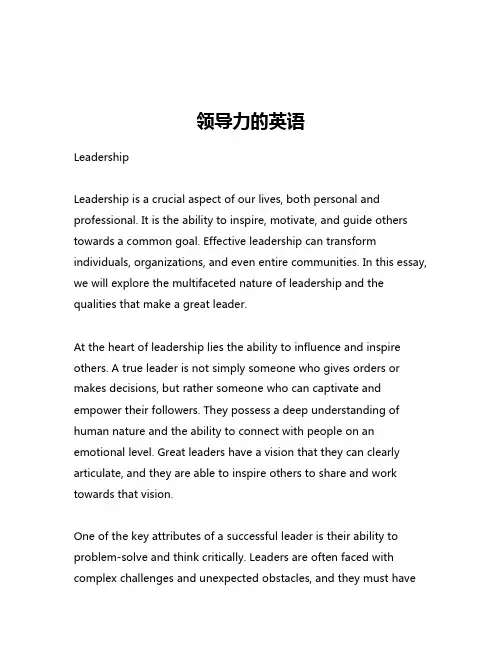
领导力的英语LeadershipLeadership is a crucial aspect of our lives, both personal and professional. It is the ability to inspire, motivate, and guide others towards a common goal. Effective leadership can transform individuals, organizations, and even entire communities. In this essay, we will explore the multifaceted nature of leadership and the qualities that make a great leader.At the heart of leadership lies the ability to influence and inspire others. A true leader is not simply someone who gives orders or makes decisions, but rather someone who can captivate and empower their followers. They possess a deep understanding of human nature and the ability to connect with people on an emotional level. Great leaders have a vision that they can clearly articulate, and they are able to inspire others to share and work towards that vision.One of the key attributes of a successful leader is their ability to problem-solve and think critically. Leaders are often faced with complex challenges and unexpected obstacles, and they must havethe cognitive flexibility to adapt and find innovative solutions. They must be able to analyze situations from multiple perspectives, weighing the pros and cons of various courses of action. This ability to think critically and make well-informed decisions is essential for effective leadership.Another crucial aspect of leadership is the ability to foster a positive and collaborative work environment. Great leaders understand the importance of building strong, cohesive teams and empowering their followers to contribute their unique skills and perspectives. They create a culture of trust, open communication, and mutual respect, which in turn leads to increased productivity, creativity, and job satisfaction among team members.Effective leaders also possess strong communication skills, both verbal and nonverbal. They are able to articulate their ideas clearly and concisely, and they are skilled listeners who can truly hear and understand the concerns and perspectives of their followers. Additionally, they are adept at using body language and facial expressions to convey confidence, empathy, and authority.Integrity is another essential quality of a great leader. Leaders must be authentic, transparent, and accountable for their actions. They must have a strong moral compass and consistently demonstrate their commitment to ethical behavior. When followers trust that theirleader is acting with integrity, they are more likely to be loyal, committed, and willing to follow that leader's lead.In addition to the qualities mentioned above, successful leaders also possess a certain degree of emotional intelligence. They are able to recognize and manage their own emotions, as well as the emotions of their followers. They can empathize with others, read social cues, and adjust their communication and leadership style accordingly. This emotional intelligence allows them to create a positive and supportive environment, which in turn fosters loyalty, motivation, and high performance among their team members.Finally, great leaders are continuous learners who are always striving to improve and expand their knowledge and skills. They are open to feedback, willing to admit their mistakes, and eager to seek out new perspectives and experiences. This commitment to personal and professional growth not only benefits the leader themselves but also inspires and encourages their followers to do the same.In conclusion, leadership is a multifaceted and complex concept that encompasses a wide range of qualities and skills. From inspiring and motivating others to problem-solving and fostering a positive work environment, effective leaders possess a unique blend of cognitive, emotional, and interpersonal abilities. By cultivating these essential leadership qualities, individuals can not only improve their ownperformance and success but also have a transformative impact on the lives of those they lead.。
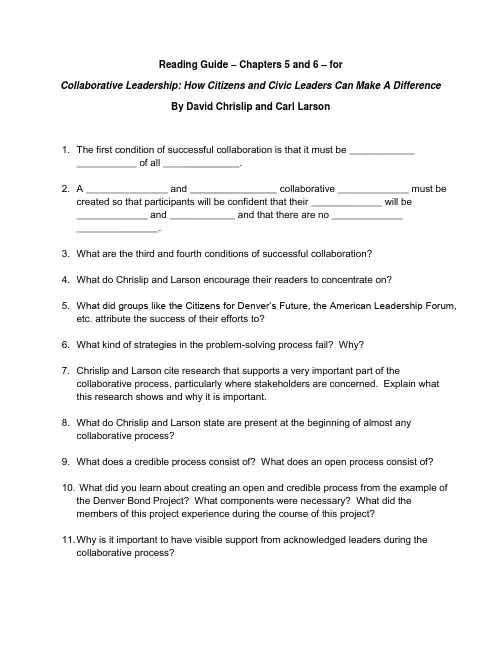
Reading Guide – Chapters 5 and6–forCollaborative Leadership: How Citizens and Civic Leaders Can Make A DifferenceBy David Chrislip and Carl Larson1. The first condition of successful collaboration is that it must be _______________________ of all ______________.2. A _______________ and ________________ collaborative _____________ must becreated so that participants will be confident that their _____________ will be_____________ and ____________ and that there are no ____________________________.3. What are the third and fourth conditions of successful collaboration?4. What do Chrislip and Larson encourage their readers to concentrate on?5. What did groups like the Citizens for Denver’s Future, the American Leadership Forum,etc. attribute the success of their efforts to?6. What kind of strategies in the problem-solving process fail? Why?7. Chrislip and Larson cite research that supports a very important part of thecollaborative process, particularly where stakeholders are concerned. Explain what this research shows and why it is important.8. What do Chrislip and Larson state are present at the beginning of almost anycollaborative process?9. What does a credible process consist of? What does an open process consist of?10. What did you learn about creating an open and credible process from the example ofthe Denver Bond Project? What components were necessary? What did themembers of this project experience during the course of this project?11. Why is it important to have visible support from acknowledged leaders during thecollaborative process?12. Chrislip and Larson cited work by Catherine Sweeney regarding what motivates andinspires volunteers in successful volunteer organizations. What did Sweeney find as the motivating factors?13. Why is it important to seek support from established authorities?14. What do Chrislip and Larson say is the leadership task in the initial phase of thecollaborative endeavor?15. What is an initiating committee and what does the committee do?16. What are the six issues that need to be addressed in the early stages of collaboration?17. How is the collaborative process promoted and sustained?18. Explain the importance of building trust in the early stages of the collaborativeprocess.19. What do Chrislip and Larson mean when they talk about “sharing ownership” as itrelates to the collaborative process?20. Explain the importance or impact celebrating successes has on the collaborativeprocess.21. Why is creating powerful, impelling experiences vital to the collaborative process?22. Chrislip and Larson cite research about leadership as it relates to collaboration: “…it isa very ______________ process.” “Collaboration is a _________-_________,______________ process that must be _________________ _________________ and ______________ __________________.”23. What kind of leaders or leadership do Chrislip and Larson say are needed in thecollaborative effort?24. Explain what is meant by “safeguarding the process”.25. Explain what “facilitating the process” means.26. What is the shift that takes place during the collaborative process?。
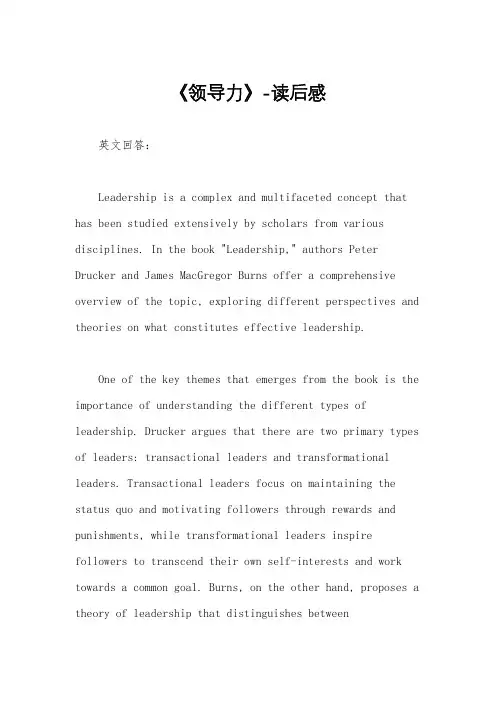
《领导力》-读后感英文回答:Leadership is a complex and multifaceted concept that has been studied extensively by scholars from various disciplines. In the book "Leadership," authors Peter Drucker and James MacGregor Burns offer a comprehensive overview of the topic, exploring different perspectives and theories on what constitutes effective leadership.One of the key themes that emerges from the book is the importance of understanding the different types of leadership. Drucker argues that there are two primary types of leaders: transactional leaders and transformational leaders. Transactional leaders focus on maintaining the status quo and motivating followers through rewards and punishments, while transformational leaders inspire followers to transcend their own self-interests and work towards a common goal. Burns, on the other hand, proposes a theory of leadership that distinguishes betweentransactional, transformational, and charismatic leaders.He argues that charismatic leaders possess a unique ability to inspire followers and create a sense of shared purpose, while transformational leaders are more focused on building relationships and empowering followers.Another important aspect of leadership that isdiscussed in the book is the role of communication.Effective leaders are able to communicate their vision clearly and convincingly, and they are also able to listento and understand the perspectives of their followers. Communication is essential for building trust and establishing a shared understanding of goals and objectives.In addition to communication, the book also emphasizes the importance of ethics and values in leadership. Ethical leaders are honest, trustworthy, and fair, and they always act in the best interests of their followers. They set a high standard of conduct and inspire others to do the same.Finally, the book discusses the importance of lifelong learning for leaders. In a rapidly changing world, leadersmust be constantly learning and adapting in order to stay ahead of the curve. They must be open to new ideas and experiences, and they must be willing to take risks and make mistakes.Overall, "Leadership" is a valuable resource for anyone interested in understanding the complex dynamics of leadership. The book offers a comprehensive overview of the topic, and it provides practical advice and insights that can help leaders at all levels to be more effective.中文回答:读完《领导力》这本书,我收获颇丰。

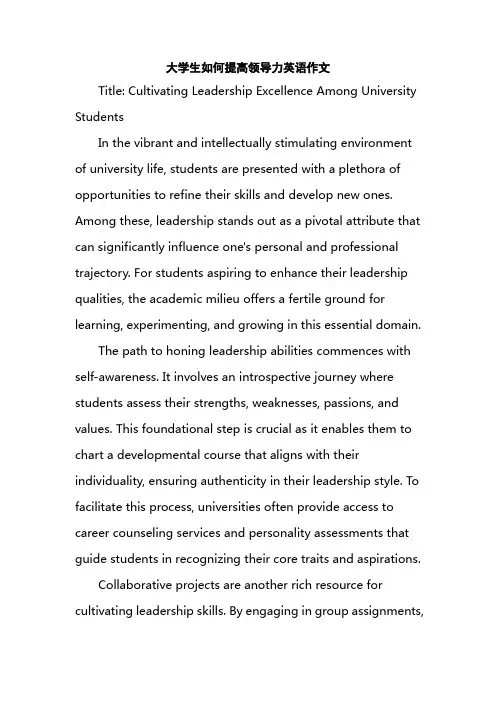
大学生如何提高领导力英语作文Title: Cultivating Leadership Excellence Among University StudentsIn the vibrant and intellectually stimulating environment of university life, students are presented with a plethora of opportunities to refine their skills and develop new ones. Among these, leadership stands out as a pivotal attribute that can significantly influence one's personal and professional trajectory. For students aspiring to enhance their leadership qualities, the academic milieu offers a fertile ground for learning, experimenting, and growing in this essential domain.The path to honing leadership abilities commences with self-awareness. It involves an introspective journey where students assess their strengths, weaknesses, passions, and values. This foundational step is crucial as it enables them to chart a developmental course that aligns with their individuality, ensuring authenticity in their leadership style. To facilitate this process, universities often provide access to career counseling services and personality assessments that guide students in recognizing their core traits and aspirations.Collaborative projects are another rich resource for cultivating leadership skills. By engaging in group assignments,students have the chance to step into leadership roles, hone their collaborative abilities, and confront the dynamic challenges that teamwork presents. These experiences offer valuable lessons in consensus building, conflict resolution, and effective communication. Universities encourage such engagements through case studies, group seminars, and extracurricular activities that necessitate team participation.Leadership workshops and training programs stand out as structured avenues for enhancing leadership competencies. Many universities feature specialized courses or invite renowned leaders to conduct workshops on diverse aspects of leadership, such as strategic thinking, emotional intelligence, and public speaking. Participation in these programs exposes students to theoretical frameworks, practical tools, and expert insights that they can integrate into their leadership repertoire.Embracing diversity is a critical aspect of leadership development in today's globalized context. Universities, with their culturally rich environments, provide an ideal setting for students to appreciate and harness the power of diversity in shaping inclusive leadership styles. Engaging with peers from varied backgrounds broadens perspectives, fostering empathyand adaptability—essential attributes for leaders in the multicultural landscape of the modern world.Seeking feedback and mentorship constitutes another vital strategy for refining leadership capabilities. Professors, alumni, and industry professionals can serve as valuable mentors, offering guidance tailored to the student's aspirations and challenges. Their experiences and insights can accelerate a student's leadership growth, helping them navigate the complexities of real-world leadership with confidence and wisdom.In conclusion, the journey towards enhancing leadership skills within the university setting is a multifaceted and enriching endeavor. Through self-discovery, active collaboration, participation in structured leadership programs, embracing diversity, and seeking mentorship, students can sculpt robust leadership profiles. As they embark on this transformative path, they not only prepare themselves for future leadership roles but also contribute to creating a more inclusive and dynamic leadership culture in the broader society. The university, thus, stands not just as an institution of learning but as a crucible for nurturing future leaders who will adeptly steer the ships of societal progress and innovation.。
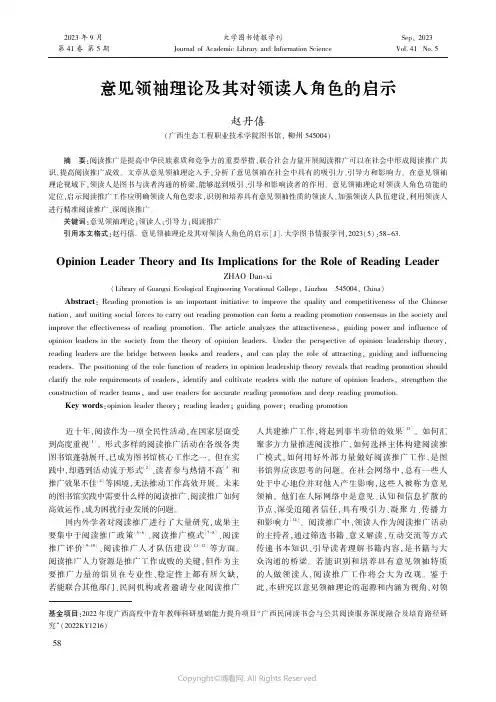
意见领袖理论及其对领读人角色的启示赵丹僖(广西生态工程职业技术学院图书馆,柳州545004)摘㊀要:阅读推广是提高中华民族素质和竞争力的重要举措,联合社会力量开展阅读推广可以在社会中形成阅读推广共识,提高阅读推广成效㊂文章从意见领袖理论入手,分析了意见领袖在社会中具有的吸引力㊁引导力和影响力㊂在意见领袖理论视域下,领读人是图书与读者沟通的桥梁,能够起到吸引㊁引导和影响读者的作用㊂意见领袖理论对领读人角色功能的定位,启示阅读推广工作应明确领读人角色要求,识别和培养具有意见领袖性质的领读人,加强领读人队伍建设,利用领读人进行精准阅读推广㊁深阅读推广㊂关键词:意见领袖理论;领读人;引导力;阅读推广引用本文格式:赵丹僖.意见领袖理论及其对领读人角色的启示[J].大学图书情报学刊,2023(5):58-63.Opinion Leader Theory and Its Implications for the Role of Reading LeaderZHAO Dan-xi(Library of Guangxi Ecological Engineering Vocational College,Liuzhou㊀545004,China)Abstract :Reading promotion is an important initiative to improve the quality and competitiveness of the Chinesenation,and uniting social forces to carry out reading promotion can form a reading promotion consensus in the society andimprove the effectiveness of reading promotion.The article analyzes the attractiveness,guiding power and influence ofopinion leaders in the society from the theory of opinion leaders.Under the perspective of opinion leadership theory,reading leaders are the bridge between books and readers,and can play the role of attracting,guiding and influencing readers.The positioning of the role function of readers in opinion leadership theory reveals that reading promotion shouldclarify the role requirements of readers,identify and cultivate readers with the nature of opinion leaders,strengthen the construction of reader teams,and use readers for accurate reading promotion and deep reading promotion.Key words :opinion leader theory;reading leader;guiding power;reading promotion㊀㊀近十年,阅读作为一项全民性活动,在国家层面受到高度重视[1]㊂形式多样的阅读推广活动在各级各类图书馆蓬勃展开,已成为图书馆核心工作之一㊂但在实践中,却遇到活动流于形式[2]㊁读者参与热情不高[3]和推广效果不佳[4]等困境,无法推动工作高效开展㊂未来的图书馆实践中需要什么样的阅读推广,阅读推广如何高效运作,成为困扰行业发展的问题㊂国内外学者对阅读推广进行了大量研究,成果主要集中于阅读推广政策[5-6]㊁阅读推广模式[7-8]㊁阅读推广评价[9-10]㊁阅读推广人才队伍建设[11-12]等方面㊂阅读推广人力资源是推广工作成败的关键,但作为主要推广力量的馆员在专业性㊁稳定性上都有所欠缺,若能联合其他部门㊁民间机构或者邀请专业阅读推广人共建推广工作,将起到事半功倍的效果[13]㊂如何汇聚多方力量推进阅读推广,如何选择主体构建阅读推广模式,如何用好外部力量做好阅读推广工作,是图书馆界应该思考的问题㊂在社会网络中,总有一些人处于中心地位并对他人产生影响,这些人被称为意见领袖㊂他们在人际网络中是意见㊁认知和信息扩散的节点,深受追随者信任,具有吸引力㊁凝聚力㊁传播力和影响力[14]㊂阅读推广中,领读人作为阅读推广活动的主持者,通过筛选书籍㊁意义解读㊁互动交流等方式传递书本知识㊁引导读者理解书籍内容,是书籍与大众沟通的桥梁㊂若能识别和培养具有意见领袖特质的人做领读人,阅读推广工作将会大为改观㊂鉴于此,本研究以意见领袖理论的起源和内涵为视角,对领基金项目:2022年度广西高校中青年教师科研基础能力提升项目 广西民间读书会与公共阅读服务深度融合及培育路径研究 (2022KY1216)2023年9月第41卷第5期㊀㊀㊀㊀㊀㊀㊀㊀大学图书情报学刊Journal of Academic Library and Information Science㊀㊀㊀㊀㊀㊀㊀㊀Sep ,2023Vol.41No.5读人的意见领袖性质进行分析,旨在帮助图书馆从业者重新认识领读人的功能和作用,做好领读人的识别和培养工作,发挥领读人在阅读推广中的号召力和影响力,为阅读推广工作提供理论支持和实践选择㊂1㊀意见领袖理论的起源和内涵1.1㊀意见领袖理论的起源和发展1940年,著名的传播学家保罗㊃拉扎斯菲尔德等利用刺激-反应范式对选民投票进行研究后发现,选民的行为和态度会受到周围亲戚㊁同事或是好友等 分子领袖 (molecular leaders)的影响,而非大众媒介[15]㊂随后,他们将这些 分子领袖 正式命名为意见领袖(opinion leader),并定义为在人际传播中经常为他人提供信息㊁意见㊁评论,并对他人施加影响的活跃分子㊂在此基础上,拉扎斯菲尔德等人提出了著名的两级传播理论(two-step-flow theory),指出信息先从媒体流向意见领袖,再从意见领袖流向不太活跃的人群[16]234-291㊂1961年,赫兰德尔对意见领袖的社会影响进行研究,发现意见领袖周围有一群追随者,他们信任㊁崇拜意见领袖,经常响应意见领袖的号召[17]㊂1965年,卡茨和拉扎斯菲尔德[16]255对意见领袖的形成原因进行解释,认为人们生活在各种各样初级群体(primary groups)中,这些群体通过面对面互动来维持,具有相对持久性和非正式性,已形成默认的规范和行为准则㊂在这些群体中,人们决策时会遇到信息可访问性㊁可信度㊁可适用性等问题,这使得他们习惯倾向于寻求周围知识丰富并具有权威的意见领袖的帮助㊂随着网络技术的发展和传播平台的演进,网络为人们提供了新型的交流渠道,任何人都可以借助网络的低门槛和开放性获得广阔的话语空间,涌现出众多诸如网红㊁大V㊁博主㊁UP主等网络意见领袖㊂网络意见领袖具有较高的活跃度,他们频繁发言,参与网友讨论,吸引网民聚集在其周围,引起网民态度的形成㊁改变或追随㊂1.2㊀意见领袖理论的内涵从1944年拉扎斯菲尔德提出意见领袖概念以来,社会学㊁管理学㊁心理学领域都不断丰富 意见领袖 理论的研究㊂值得注意的是,不管是传播学还是其他学科,不管是传统领域还是网络空间,研究者都强调了意见领袖在人际传播中的角色和作用,都认为意见领袖是那些能更快㊁更多地接触信息,并对信息进行加工和解释,再通过人际关系对信息进行扩散和传播并对他人施加影响和引导的人物㊂1.2.1㊀意见领袖是有吸引力的人意见领袖对周围人具有吸引力是由个体特征决定的㊂罗杰斯认为意见领袖具有外貌上的吸引力和社交上的吸引力[18]㊂在人际交往的初期,对方的容貌占有重要地位,具有外表吸引力的人也会有更大的人际吸引力㊂意见领袖的外貌在其整体的形象中占据重要地位,很多意见领袖都有突出的外表,能迅速吸引周围人关注㊂从人口统计学来看,意见领袖具有很强的社交吸引力,他们爱交际㊁有更大的自信和世界主义㊂他们喜欢正式和非正式交流,有较高的身体移动性(喜欢旅行和搬家)[19]㊂梦非认为意见领袖具有合群㊁社交活跃㊁容易亲近及可信任的特征[20]㊂Weimann认为意见领袖往往是某一领域的专家,他们具有创新性㊁良好的表达能力㊁更高的媒体曝光性,比追随者具有更大的国际视野,这使得他们在人群中熠熠生辉[21]㊂在网络环境下,意见领袖社交范围广㊁信息渠道多㊁传媒接触大,他们有更多的机会引导和影响周围群体㊂1.2.2㊀意见领袖是有引导力的人意见领袖具有引导力是由其所处的社会网络位置决定的㊂一般而言,意见领袖是某一意见群体中的核心人物,拥有一定数量的追随者,追随者基于对意见领袖的信任和认同而聚集成意见圈群㊂意见领袖与其他群体成员有着大体相同的生活经验㊁文化背景以及共同的交流符号系统,这使得信息扩散和传播的阻力最小[22]㊂在获取媒介信息后,意见领袖可以通过群体成员最习惯㊁最容易达成理解的符号传递自己加工过的信息,并通过人际直接互动方式来确保沟通的有效性㊂这种直接的㊁生活化的互动,亲切㊁随意的沟通有助于互信的达成㊂其次,意见领袖是信息的过滤者和加工者,他们往往率先获知信息,成为传播过程中的第一层受众,同时他们也是下一级的传播者,充当着信息 把关人 的角色㊂在信息二次传播过程中,他们会基于自己的专业知识对信息进行重构[23]㊂这使得意见领袖可以通过自身的影响力,对信息进行二次扩散,也使得媒介和组织发出的信息,在覆盖面的拓展和理解度的提升方面成为可能㊂Raghuram[24]等对新产品传播中的意见领袖进行社会计量分析,证实意见领袖处于社会网络的中心位置,中心性越高追随者越多,他们的人际网络资本和信息资本越大,意见领袖具有的引导力也会越大㊂1.2.3㊀意见领袖是有影响力的人从意见领袖的研究起源来看,拉扎斯菲尔德和卡茨发现选民投票主要受面对面交流的影响,大多数选总第199期大学图书情报学刊2023年第5期民主要从身边的意见领袖处获得信息,而非大众媒介㊂意见领袖比其他人更留意和关注媒体信息,他们比普通人拥有更多信息,而且能够利用自身知识和手段对获取的信息进行过滤和传播,其他选民从他们那里获取对问题的观念和态度㊂从意见领袖的概念来看,Arndt将意见领袖定义为人际网络传播中最先或最多接触大众媒体信息,并将自己获取的客观信息加工后传播给他人的人[25]㊂Corey认为意见领袖是在团队中被信任且消息灵通的人士,他们对事件有独到的见解,并乐于分享给周围的人[26]㊂罗杰斯认为意见领袖是那些经常地㊁非正式地影响他人,而使得他人的态度与行为发生变化的人[27]㊂Mancuso认为那些经常被他人请教或征询意见的人称为意见领袖,他们通过口碑交流来正式影响其他人的购买决策[28]㊂2㊀领读人的意见领袖性质分析领读人是带领某人或某群体读书的人, 领读 中的 领 为动词,有统领㊁带领和引导之意[29]㊂从这个意思来看,领读人具有将群体引向某一条道路的作用,如吸引读者参加活动㊁推荐图书㊁决定阅读方式㊁带领阅读,解释图书内容,并对读者造成影响㊂从获取图书信息和决定传播这些信息的最佳路线㊁解读书本内容并给出阅读建议的角度看,阅读推广中的领读人具有意见领袖性质㊂在推广活动中,信息传播的模式也遵循拉扎斯菲尔德提出的二级传播模式,传播路径为 图书 领读人(意见领袖) 读者 ㊂2.1㊀领读人吸引读者阅读阅读推广就是图书馆通过精心创意㊁策划,将读者的注意力从海量馆藏引导到小范围有吸引力书籍的过程[30]㊂领读人利用自身魅力吸引读者参加阅读推广活动,利用选书和荐书激发读者阅读兴趣㊂领读人一般是某个领域的专家,他们知识丰富㊁具有一定知名度,在产品涉入度上比一般读者高,号召力甚至超过传统媒体[31]㊂领读人依托专业知识选择书籍,他们对书籍的选择可以节省读者时间,提高读者阅读兴趣㊂图书推荐是领读人最基础的工作,可以让茫然无头绪的读者找到阅读切入点,勾起阅读欲望,也能激活馆藏资源㊂领读可以帮助读者与未知信息建立联系,跟传统过程相比,效率更高,效果更佳㊂2017年,网易蜗牛读书APP开设领读人功能,领读人像专业的阅读者一样,通过推荐书籍将关注同一领读人的用户聚集在一起,然后通过撰写书评和回答问题等方式让读者了解一本书对自己是否有帮助㊁是否适合自己等,为读者提供阅读决策㊂小红书在2020年开展了领读人活动,读书博主们通过短视频或者文字方式为读者提供书单,介绍书籍内容,吸引读者阅读㊂樊登读书会利用具有巨大影响力或丰富阅读量的人,有针对性地为读者推荐图书,领读人通过45分钟讲解一本好书,致力于帮助没有时间读书㊁不知道读什么书的人了解图书内容㊂2.2㊀领读人引领读者阅读领读人通过对书籍和读者进行分析,寻找适合读者阅读的方式引领读者阅读㊂领读人在对读者和书籍内容了解的基础上,根据阅读推广对象的接受情况选择不同的领读方式㊂他们会充分考虑读者需求,并根据读者接受和反馈情况,不断调整并优化阅读推广方式㊂有的领读人还会通过亲身示范阅读㊁问题驱动读者阅读㊁对读者阅读进行评价来开展阅读指导,也会采用读者默读㊁团体阅读㊁小组阅读等方式促进读者对书籍内容的理解㊂他们总能立足读者的生活实际与阅读经验,以阅读为抓手,以内容理解为终点,以培养阅读习惯为核心,借助书籍唤起读者隐没的记忆碎片,带领他们了解书中呈现的人文内容与思维内涵,领悟潜藏在文字背后的复杂事物,让读者从书籍中汲取前所未有的力量㊂华为阅读领读人单霁翔利用华为的5G技术带领读者参观故宫,利用虚拟仿真技术再现故宫精美文物修复过程,和读者共同探索美好的故宫文化㊂掌阅APP阅读平台探索以领读人脱口秀㊁情景剧的形式将阅读与文化主题相结合,让读者对文化形成更具象化的认识㊂张泉灵㊁罗振宇等活跃在微信㊁喜马拉雅㊁快手等具有社交属性的自媒体平台,他们根据图书的不同内容选择不同的领读方式,如直播㊁短视频㊁音频等,将阅读与自媒体相结合,给读者以视觉和听觉的冲击,激发阅读兴趣,将读者从走马观花式的浏览慢慢领入长阅读㊁深阅读的状态之中㊂2.3㊀领读人给读者带来影响领读过程是一个示范和引领的过程,是一个思想碰撞的过程,是一个价值输出的过程,也是培养读者阅读习惯的过程㊂首先,领读人是在某一领域有专业造诣或者具有一定阅读能力的个人,其自身阅读经验和阅读技巧在推广过程中潜移默化传递给读者,让不会阅读的人学会阅读㊂领读人采用各种方式提高读者兴趣,推动不愿意阅读的人来图书馆,引导不喜欢阅读的人逐渐爱上阅读[32]㊂其次,领读过程是一个思想碰撞和价值输出的过程㊂在领读过程中,领读人利用自身经验讲解书籍内容,实现思想碰撞和心灵交流赵丹僖:意见领袖理论及其对领读人角色的启示的动态过程㊂美国心理学家Goodman认为阅读是一种复杂的心理认知过程[33],读者通过主动认知来感知和体会文章的情感,并以此建构自己的内心语言㊂在领读人的带领下,读者与书中内容不断对话,感受到作者的审美情趣,从而爱上阅读㊂最后,领读人的最终目的是让读者形成阅读习惯㊂通过领读人的引领㊁示范阅读,读者在阅读过程中体会到阅读的方法和乐趣,感受到阅读带给自己心理上的变化,最终将阅读作为一种生活态度㊁一种工作责任㊁一种精神追求㊂前央视主持人王潇出版了一系列作品,同时作为豆瓣平台的领读人向广大女性传递一种生活态度和价值观:阅读和教育是女性成长的必由之路㊂中宣部等表彰的 乡村阅读榜样 中,阅读领读人不仅能坚持自身阅读,还能带动更多人阅读,他们以多种方式将阅读深植乡村,引领乡村阅读风尚,激发农民阅读兴趣,培养农民阅读习惯㊂3㊀意见领袖理论对领读人角色的启示已有研究表明,意见领袖具有重要的传播价值和影响作用,具有意见领袖性质的领读人自身具有吸引力和凝聚力,是阅读推广活动的主导者;具有引领力和引导力,是阅读活动的鼓励者,他们还是某一领域的专家,可以凭借自身阅历和经验对书中内容进行诠释,使读者深刻理解其中内容,引导读者深阅读㊁长阅读㊂因此,在阅读推广活动中,应明确领读人角色要求,发挥意见领袖的影响力来提高推广活动的成果与实效㊂3.1㊀充分利用社会圈层,实现精准阅读推广在阅读推广中,需针对不同类型的领读人设计不同的阅读推广活动,充分发挥领读人在不同圈层的正面号召作用,以达到覆盖不同社会群体的目的,满足读者个性化需求㊂图书馆要积极与社会组织㊁教育机构㊁社区合作,从各行各业中识别意见领袖,特别关注当地的公务员㊁教师㊁大学生㊁民间阅读推广人㊁读书会负责人㊁新媒体推广人等㊂在大学中,大学生群体㊁各专业学科带头人㊁教授或者行政领导等是大学校园里的意见领袖,他们若能加入阅读推广队伍,将吸引更多读者参加阅读推广活动㊂其次,图书馆可以利用算法技术挖掘社会热点并识别圈层中具有意见领袖性质的领读人,进而根据领读人的特点进行精细运营,打造不同知识领域的特色阅读品牌,进行主题鲜明㊁有深度㊁有思想的阅读推广活动㊂同时,图书馆应做好圈层的资源精准定位和服务保障,深入了解圈层中读者需求,通过数字化技术深耕推广内容,整合信息资源,实现精准推送,为领读活动提供保障[34]㊂3.2㊀利用领读人特点,提高深阅读服务质量深阅读是发展思维的精读㊁细读,是一种自发的阅读行为[35],这种阅读方式更能激发读者的阅读兴趣,提高其思辨能力,给读者带来高层次阅读体验㊂深阅读是图书馆阅读推广的发展方向㊂很多具有意见领袖气质的领读人都是某方面的专家,在各自领域内颇具话语权,也能凭借个人名气和自身特征(颜值容貌㊁人格特质㊁思想价值观)频频产出精准契合读者需求的优质内容,牢牢抓紧公众眼球㊂图书馆应根据领读人特点,设计符合领读人的深阅读推广服务模式㊂比如,领读人是美术方面的专家,可以展览㊁海报等方式引入主题阅读活动,同时设置领读人讲座㊁访谈等形式开展阅读推广,引起读者思考,提升读者素养㊂图书馆还可以通过领读人,为读者推荐许多未被注意到的优秀作品㊂比如‘我们与世界“这本书知道的人并不多,但清华妈妈马兰花认为书中内容生动,很适合孩子阅读㊂在她的讲解与推荐下,这本书一个月卖出近7000册㊂董宇辉把‘中国哲学简史“等小众图书卖出了近几十万本㊂当然,领读人还应注重与读者的互动,他们与读者之间的关系越亲密,黏性就会越强,可以与读者建立关系紧密的社群,不定期与粉丝互动㊁见面,充分发挥社交媒体的作用,最大化发挥领读人影响力㊂3.3㊀建立健全领读人管理制度,加强领读人队伍建设意见领袖周围都有一群追随者,具有意见领袖性质的领读人周围也有一群信任他们的读者㊂图书馆应根据领读人身份㊁个人特色打造具有辨识度的形象化标签㊂细分不同领域领读人的培养方案,强化领读人特色,形成具有鲜明特色的人设属性㊂如董宇辉在推荐图书时是安静地分享㊁幽默地讲述,让读者感受他对阅读的认识,感受到文字的力量㊂得到APP创始人罗振宇营销时采用故事形式,他的每周例会直播是故事, 时间的朋友 跨年演讲也是故事,而且大故事里有无数个小故事㊂在互联网环境下,意见领袖以网红的形式呈现,图书馆在自身能力不足的情况下,可探索与MCN(网红经济运作模式)商业机构合作的方式培养领读人,由公司提供一体化的运行路径,提高领读人流量㊂其次,图书馆应建立详细的领读人评估方法㊁考核和激励制度㊂评估方法要能分析领读人影响力㊁圈层属性及擅长方向,考核要能从制度层面确定领读人绩效,激励要有奖惩制度,让领读人就推广过程相关主题进行深入思考与研究,借助自我与外界总第199期大学图书情报学刊2023年第5期力量加深对阅读推广的认识和理解㊂最后,图书馆还应组织开展多种形式的培训来提高领读人的阅读推广技能,不断加强领读人专业能力和业务素质㊂4 结语对阅读推广质量和效果的追求一直是图书馆从业人员毕生研究的课题,如何吸引并用好社会力量参与阅读推广一直是图书馆界关注的重点㊂意见领袖是人际传播的中心环节,对周围群体具有吸引力㊁凝聚力和影响力㊂领读人作为阅读推广中带领某人或群体读书的人,利用自身魅力吸引读者参加阅读推广活动,利用选书和荐书激发读者阅读兴趣㊂他们在活动过程中将自身阅读经验和阅读技巧传递给读者,影响读者阅读态度和阅读能力㊂对领读人意见领袖性质的分析,可以帮助我们明确领读人角色的定位,启示我们在阅读推广工作中应识别和培养具有意见领袖性质的领读人,加强领读人队伍建设,利用领读人实现精准阅读推广㊁深阅读推广㊂国内对阅读推广理论研究不多,本文引用 意见领袖 理论对阅读推广中的领读人性质进行分析,深刻揭示领读人在阅读推广中吸引读者参与㊁引导读者阅读㊁影响读者思想的作用㊂在国内高质量发展语境下,对阅读推广理论进行研究不仅有助于理解阅读推广本质属性,也有助于工作人员厘清阅读推广工作思路,还有助于坚持阅读推广在图书馆实践工作中的主体地位,进而优化图书馆服务功能,提升图书馆话语权㊂参考文献:[1]刘旭青,刘培旺,柯平,等.面向全民阅读的公共图书馆阅读推广评估标准研究[J].国家图书馆学刊,2021,30 (5):47-55.[2]刘莹.基于42所 双一流 高校图书馆的阅读推广调研分析[J].图书馆学刊,2022,44(3):106-113. [3]朱馨叶,张小倩,李桂华.图书馆阅读推广活动激励机制研究 基于2018年国内图书馆 世界读书日 活动案例[J].大学图书馆学报,2019,37(4):71-78. [4]杨新涯,尹伟宏,王莹.论大学图书馆阅读推广的转型[J].图书情报工作,2020,64(17):58-63. [5]李梦竹,张莉,任姝萍,等.我国未成年人阅读推广政策研究(1980-2020) 基于国家层面相关政策文本分析[J].图书馆理论与实践,2021(04):92-101,136. [6]Cho Y,Chae Y.A Research on the Evaluation and Improvement of Policy for Reading Promotion[J].Journalof Korean Library and Information Science Society,2014, 45(3):169-190.[7]吴凤玲.基于媒介融合的数字阅读推广模式研究[J].情报科学,2021,39(12):68-71.[8]钟海欧.全民健身背景下 体育+ 全民阅读推广模式探究 基于5W1H分析法[J].图书馆工作与研究, 2022(6):123-128.[9]马迪倩.用户体验测度下高校图书馆阅读推广成效评估模型构建及有效性分析[J].图书馆学研究,2022 (4):60-68.[10]杨飞,李武,罗笑婷.图书馆阅读推广人工作技能和满意度自我评价研究[J].图书馆杂志,2022,41(11):70 -77.[11]王姝,马家伟.全民阅读背景下高校阅读推广人培育策略研究[J].图书馆工作与研究,2020(10):115-122.[12]Zapata D A,Giraldo Y N.Library representations aboutthe Public library,reading,the reader,and promotion and encouragement to reading in Medellin,Colombia[J].Investigation Bibliotecologica,2009,23(4):197-240 [13]石恢.民间阅读组织与书香城市建设[J].科技与出版,2019(8):21-26.[14]聂静虹,常力轩.在线健康社区意见领袖内容传播力的影响因素 以丁香园 丁香达人 帖子为中心[J].新闻与传播评论,2022,75(4):61-73. [15]保罗㊃F㊃拉扎斯菲尔德,伯纳德㊃贝雷尔森,黑兹尔㊃高德特.人民的选择 选民如何在总统选战中做决定[M].唐茜,译.北京:中国人民大学出版社, 2011:43.[16]伊莱休㊃卡茨,保罗㊃F㊃拉扎斯菲尔德.人际影响 个人在大众传播中的作用[M].张宁,译.北京:中国人民大学出版社,2015:234-291 [17]Hollander E P.Emergent leadership and social influence[J].Leadership and interpersonal behavior,1961(5): 30-47.[18]Rogers E.M.Cartano D.G.Methods of measuringopinion leadership[J].Public Opinion Quarterly,1962: 26(3),435-441.[19]Baumgarten S A.The Innovative Communicator in theDiffusion Process.Journal of Marketing Research,2012(2):12-18.[20]梦非.社会化商务环境下意见领袖对购买意愿的影响研究[D].南京:南京大学,2012:52.[21]Weimann G.The influentials:Back to the concept ofopinion leaders[J].Public Opinion Quarterly,1991,55(2):267-279.[22]Brown J,Broderick A.Word of mouth communicationwithin online communities:Conceptualizing the online赵丹僖:意见领袖理论及其对领读人角色的启示。
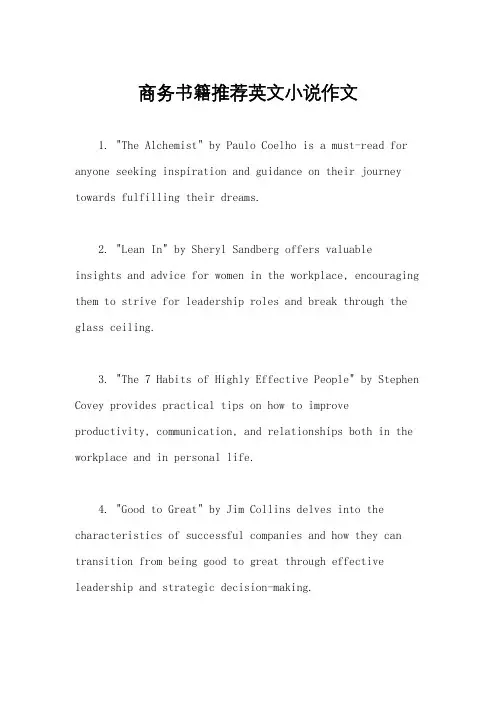
商务书籍推荐英文小说作文1. "The Alchemist" by Paulo Coelho is a must-read for anyone seeking inspiration and guidance on their journey towards fulfilling their dreams.2. "Lean In" by Sheryl Sandberg offers valuableinsights and advice for women in the workplace, encouraging them to strive for leadership roles and break through the glass ceiling.3. "The 7 Habits of Highly Effective People" by Stephen Covey provides practical tips on how to improve productivity, communication, and relationships both in the workplace and in personal life.4. "Good to Great" by Jim Collins delves into the characteristics of successful companies and how they can transition from being good to great through effective leadership and strategic decision-making.5. "Start with Why" by Simon Sinek explores the importance of having a clear sense of purpose and how it can drive success in business and in life.6. "Thinking, Fast and Slow" by Daniel Kahneman delves into the psychology of decision-making, highlighting the biases and cognitive processes that influence our choices.7. "The Lean Startup" by Eric Ries offers a revolutionary approach to launching and managing startups, emphasizing the importance of rapid experimentation and feedback.8. "Drive: The Surprising Truth About What Motivates Us" by Daniel H. Pink challenges traditional notions of motivation and offers a fresh perspective on how to inspire and engage employees.9. "Originals: How Non-Conformists Move the World" by Adam Grant explores the habits and practices of original thinkers and innovators, offering insights on how to foster creativity and drive change.10. "The Power of Habit" by Charles Duhigg delves into the science of habit formation and how understanding and changing our habits can lead to personal and professional success.。

emba经典书籍英文版摘要:1.引言2.emba 经典书籍英文版推荐a) 《影响力》b) 《创新者的窘境》c) 《关键对话》d) 《团队协作》e) 《大数据时代》3.学习英文版emba 经典书籍的意义4.如何提高阅读英文版emba 经典书籍的能力5.总结正文:emba 经典书籍英文版是许多企业家和管理人员的学习首选。
这些书籍涵盖了商业领域的各个方面,包括领导力、创新、沟通和协作等。
以下是一些值得推荐的英文版emba 经典书籍。
1.《影响力》(Influence: The Psychology of Persuasion)作者罗伯特·西奥迪尼(Robert Cialdini) 揭示了人际互动中的六大影响力原则,帮助读者了解如何更好地影响他人,以及如何防止自己受到不良影响。
2.《创新者的窘境》(The Innovator"s Dilemma)克莱顿·克里斯坦森(Clayton Christensen) 在这本书中提出了“破坏性创新”的理论,解释了为何优秀的公司会陷入困境,以及如何在创新中找到突破口。
3.《关键对话》(Crucial Conversations)作者凯里·帕特森(Kerry Patterson)、约瑟夫·格雷尼(Joseph Grenny)、罗恩·麦克米兰(Ron McMillan) 和艾尔·斯维茨勒(Al Switzler) 提供了一套应对高压和高风险情况下的沟通技巧。
4.《团队协作》(The Five Dysfunctions of a Team)Patrick Lencioni 以一个寓言故事的形式,讲述了团队中可能存在的五大问题,并提供了解决方法。
5.《大数据时代》(Big Data: A Revolution That Will Transform How We Live, Work, and Think)作者维克托·迈尔- 舍恩伯格(Viktor Mayer-Schnberger) 和肯尼思·库克尔(Kenneth Cukier) 阐述了大数据如何改变我们的生活和商业决策。
温州中支行政人事部[201101]书是人类进步的阶梯——“书海导航”第一期导读高尔基说过:“书是人类进步的阶梯,终生的伴侣,最诚挚的朋友”。
的确,阅读对人成长的影响是巨大的,一本好书往往能改变人的一生。
在繁忙工作之余,能找到一本能够给自己以启发、能够学以致用的好书,享受阅读的快乐,正是《书海导航》系列的推出所希望带来的效果。
温州中支行政人事部此次推出“书海导航”第一期,该书由彭总亲自推荐,供大家结合自身实际情况进行学习。
温州中支行政人事部[201101]《再造卓越》原书名:《How the Migty Fall:and Why Some Companies Never Give in》定价:39:00书号:978-7-5086-2388-7作者:吉姆〃柯林斯译者:蒋旭峰出版社:中信出版社出版日期:2010年10月出版开本:16开页码:208此次提供为本书部分内容,再造卓越电子版下载链接:ftp://10.33.0.25/upload/温州/中支office培训/再造卓越.pdf操作说明:按住ctrl并单击鼠标温州中支行政人事部[201101]【简介】为什么贝尔斯登、雷曼兄弟公司、房利美这些业内翘楚纷纷陨落?为什么那么多卓越的公司难以基业长青?企业帝国是如何陨落的?我们又该如何尽早预测并避免这种局面出现?一个企业在坠入万劫不复的深渊之前颓势会延续多久?一个陷入衰退的企业又该如何自救?吉姆〃柯林斯和他的研究小组直面这些难题,认真分析了11家在历史上走过从辉煌到衰落历程的企业,并对这些企业的历史进行了深入剖析。
历时4年多的研究项目向我们揭示了企业衰落的五个阶段:狂妄自大、盲目扩张、漠视危机、寻找救命稻草和遭人遗忘或濒临灭亡。
但即使企业已经陷入了衰退,它们仍然可以扭转乾坤。
如果对于上述五个阶段能做到了然于胸,那么领导者就能极大地降低企业坠入谷底的机率。
强者恒强并非世间法则,但衰落是可以避免的,衰落是可以察觉的,衰落是可以逆转的。
如何提升自己的领导力英语作文英文回答:Enhancing Your Leadership English.As leaders navigate the complex and globalized landscape of the 21st century, mastering the English language has become paramount to their success. English is the lingua franca of international business, diplomacy, and academia, enabling leaders to communicate effectively with diverse audiences and build global networks. Enhancingone's leadership English requires a multifaceted approach that encompasses linguistic proficiency, cultural awareness, and effective communication skills.1. Linguistic Proficiency.Fluency in English is the cornerstone of effective leadership communication. This includes a strong command of grammar, vocabulary, and pronunciation. Leaders shouldstrive to expand their vocabulary by reading widely, listening to podcasts and speeches, and actively engagingin conversations with native English speakers. Additionally, working with a language coach or taking courses can provide structured guidance and feedback to improve proficiency.2. Cultural Awareness.Effective communication extends beyond language proficiency to an understanding of the cultural nuances and linguistic conventions that shape English communication. Leaders should be aware of idioms, slang, and cultural references that may carry different meanings across cultures. This can be achieved through immersion inEnglish-speaking environments, interacting with native speakers, and studying the history and cultural context of the language.3. Effective Communication Skills.While linguistic proficiency and cultural awareness are essential, effective communication also involves masteringpresentation and interpersonal skills. Leaders should develop strong public speaking abilities, including clear diction, effective body language, and the ability to engage an audience. Additionally, they should cultivate active listening skills and demonstrate empathy and respect in their communication with others.4. Global Networking and Collaboration.English proficiency enables leaders to connect with colleagues and partners across borders, fostering collaboration and innovation. Attending international conferences, participating in virtual platforms, and engaging in online discussion forums can provide opportunities to build relationships and share knowledge with a global audience.5. Continuous Learning and Development.Leadership English is an ongoing journey that requires continuous learning and development. Leaders should seek out opportunities to practice their English skills, whetherthrough formal training programs, informal conversations, or self-directed study. Regularly reviewing grammar rules, expanding vocabulary, and refining communication techniques can help maintain and enhance proficiency.中文回答:如何提升自己的领导力英语。
OD组织发展必读经典书籍(六):哥伦比亚大学组织发展课·伯克“理论是浓缩的现实”本系列文章对每本经典OD书,提炼三个最深刻的知识点,燃起你对该书兴趣,经典书值得反复阅读和咀嚼。
第6本《哥伦比亚大学组织发展课》W・沃纳・伯克本书发表于1994年,约15万字。
推荐指数:5星和伯克的另外一本著作《组织变革-理论和实践》相比,这本书阅读不算太费劲。
原因是《组织变革-理论和实践》书中大量的引用别的学者的理论和模型,如果你对哪些组织领域专业知识不够,相对来说理解起来是非常费劲的,但是随着你知识网越来越密,阅读就越来越轻松。
在阅读书的时候,有3个小提醒和心得:1.书的含金量越高和书的阅读困难度越高的,2.时代越近越流行的书,其理论是越没有经过时间的考验。
3.在组织发展领域,尽量看国外的专业学者的经典书,至少在基础理论搭建上。
本书简单提到了OD的发展历史脉络,也包含作者来自咨询经验中的几个咨询案例,阅读起来比较容易,也适合我们用拿来主义,改改就能成为我们的工具方法论。
本书其实也可以归来在第一类咨询顾问类,不过伯克该书的篇幅其实也有不少模型的介绍特别是他自己的一个自创组织模式:伯克·利特温变革模型,所以我还是放在了第二类,组织模型类。
伯克的2本书,都提到了他自己的模型伯克·利特温模型,你会觉得有点点重复。
但是,一旦喜欢一个学者,并且他在我的心目中的地位非常高,我就会习惯把他的中文版的书,都找来读我系列文推荐的所有的书在作者,你值得把他所有的翻译的中文书拿来读,这样的世界级高水平学者真的没有你想象这么多的。
知识点一:四种变革变革模型对比图1OD领域的模型,一类是【咨询过程】的模型,比如张美恩,布洛克书中提到的咨询顾问循环圈,都从拿合约确定目标作为第一步。
这个2者都属于【OD步骤过程】的模型,是指导OD实践者先做什么,后做什么,最后做什么。
还有一类是六个盒子,7S,五星模型,把组织系统分为若干的【变量因素】的模型。
卓有成效的管理者读书计划英文回答:As an effective manager, I believe that a reading plan is crucial for personal and professional growth. Reading allows me to gain new knowledge, expand my perspectives, and stay updated with the latest trends and ideas in my industry. It also helps me improve my communication skills, critical thinking abilities, and decision-making capabilities.To create an effective reading plan, I follow a few key steps. First, I identify my goals and areas of interest. This helps me choose books that are relevant to my needs and will provide the most value. For example, if I want to improve my leadership skills, I might choose books on effective leadership or management techniques.Next, I allocate dedicated time for reading. This could be during my commute, before bed, or during lunch breaks.By setting aside specific time slots for reading, I ensure that it becomes a regular habit and not something I do only when I have spare time.I also mix up the types of books I read. While it's important to read books related to my industry, I also enjoy reading fiction, biographies, and self-help books. This variety keeps me engaged and prevents burnout. For instance, I might read a business strategy book one week, followed by a novel the next, and then a book on personal development.Furthermore, I actively seek recommendations from colleagues, mentors, and industry experts. This helps me discover books that I may not have come across on my own. I also join book clubs or online communities where I can discuss and share insights with other readers. This not only enhances my understanding of the books but also allows me to learn from different perspectives.Lastly, I make it a point to apply what I learn from my reading into my work and daily life. For example, if I reada book on effective communication, I will consciously practice the techniques and strategies mentioned in thebook during team meetings or client interactions. This ensures that I not only gain knowledge but also put it into action.Overall, having a well-planned reading schedule helps me stay informed, inspired, and continuously growing as a manager. It allows me to stay ahead of the curve, makebetter decisions, and effectively lead my team.中文回答:作为一名卓有成效的管理者,我相信制定一个读书计划对于个人和职业成长至关重要。
卓有成效的管理者读书计划英文回答:Effective managers understand the importance of continuous learning and self-improvement. Reading books is one of the most valuable ways to gain knowledge andinsights that can be applied to their management practices. As a manager myself, I have developed a productive reading plan that has helped me enhance my skills and stay ahead in the ever-changing business landscape.First and foremost, I prioritize reading books that are relevant to my industry and profession. This allows me to stay updated with the latest trends, best practices, and emerging technologies. For example, in the field of marketing, I make sure to read books on digital marketing, social media strategies, and consumer behavior. This knowledge helps me make informed decisions and devise effective marketing campaigns for my organization.In addition to industry-specific books, I also read books on leadership and management. These books provide valuable insights into effective communication, team building, and decision-making. For instance, I recentlyread "The Five Dysfunctions of a Team" by Patrick Lencioni, which explores the common pitfalls that hinder team performance and offers practical solutions to overcome them. This book has helped me identify areas of improvementwithin my team and implement strategies to foster a more collaborative and productive work environment.Furthermore, I believe in the power of personal development books. These books focus on mindset, motivation, and self-improvement. They provide valuable advice on managing stress, building resilience, and achieving work-life balance. For example, "The 7 Habits of HighlyEffective People" by Stephen Covey has been instrumental in helping me prioritize my tasks, manage my time effectively, and maintain a positive mindset even during challenging times.To ensure that I make the most out of my reading plan,I allocate dedicated time for reading each day. This could be during my commute to work, before going to bed, orduring weekends. By setting aside specific time for reading, I am able to consistently engage with books and absorb the knowledge they offer.I also make it a point to discuss the books I read with my colleagues and peers. This allows for valuable discussions and the exchange of ideas. For example, after reading a book on leadership, I organized a team meeting where we discussed the key takeaways and brainstormed waysto implement the concepts in our day-to-day work. This not only deepens my understanding of the book but also encourages a culture of continuous learning within my team.中文回答:高效的管理者明白持续学习和自我提升的重要性。
Excelling as a Student Leader: Key Principles for SuccessBeing a student leader is a fulfilling and influential role that comes with great responsibilities. Whether you are a class representative, club president, or any other form of student leader, your actions and decisions can have a significant impact on your peers and the overall school community. To excel in this role, it is important to embrace certain principles and develop key skills. In this article, we will explore essential guidelines for becoming an effective student leader.1. Lead by Example:As a student leader, your behavior sets the standard for others. Be a role model by demonstrating integrity, respect, and responsibility in your actions. Show dedication to your studies, punctuality, and a positive attitude. By leading through your own actions, you inspire others to follow suit.2. Effective Communication:Communication is the cornerstone of effective leadership. Develop strong listening skills and be open to different perspectives. Clearly articulate ideas and concerns, ensuring that your message is understood by all. Actively engage with your peers, teachers, and the school community, fostering an environment ofopen dialogue and collaboration.3. Build Relationships:Being a student leader means working with and for others. Invest time in building meaningful relationships with your fellow students, teachers, and administrators. Establish trust, empathy, and a sense of camaraderie. By fostering positive relationships, you create a supportive and inclusive environment that encourages the growth and success of everyone.4. Time Management:Balancing academic commitments, extracurricular activities, and leadership responsibilities can be challenging. Develop effective time management skills to stay organized and meet deadlines. Prioritize tasks, create schedules, and delegate responsibilities when appropriate. By managing your time effectively, you can fulfill your duties while maintaining a healthy work-life balance.5. Problem-solving and Decision-making:Student leaders often face challenges and need to make important decisions. Sharpen your problem-solving and decision-making skills by gathering information, evaluating options, and considering the potential consequences. Seek input from others, collaborate, and approach challenges with a solution-oriented mindset. Your ability to make informed decisions will contribute to thegrowth and development of your school community.6. Continuous Learning:Embrace a mindset of lifelong learning. Seek opportunities for personal and professional growth. Attend workshops, conferences, and leadership development programs. Read books, listen to podcasts, and engage in discussions that broaden your knowledge and perspectives. By continuously learning and evolving, you can better serve your fellow students and adapt to changing circumstances.Conclusion:Being a student leader is an honor and a privilege. By adhering to these principles and embracing the skills discussed, you can make a positive impact on your school community. Remember to lead by example, communicate effectively, build relationships, manage your time wisely, solve problems, and never stop learning. As you strive to excel as a student leader, you will inspire others, create a vibrant school community, and leave a lasting legacy.。
Reading Guide – Chapters 7 and 8 - for
Collaborative Leadership: How Citizens and Civic Leaders Can Make A Difference
By David Chrislip and Carl Larson
1. Successful collaboration produces results, not just structures and activities that
create the illusion that a problem is being addressed. How? What are the differences between these two?
2. Why do you think that people resist change when old ways of doing things fail? What can you do to make this different?
3. Collaboration most often fails because of poor execution rather than poor strategy. Why?
4. How does Chapter 7 restate the collaborative process?
5. What are the four categories of results that collaboration gives as stated in Chapter 7?
6. How does Businessman Frank Fiore describe vision?
7. Why do you feel there is a barrier to action in switching gears from the planning process to the implementation process?
8. Why is common focus important?
9. People readily talk of the need to “empower” others, but no one can figure out how to do it. Who must empower people?
10. Why is it imperative to measure success?
11. Getting results is all too often where collaboration fails, why?
12. What is the role of leadership in collaboration?
13. What are the two predominant types of leadership in our culture? How have you experienced each of these?
14. To assume participants in a collaborative initiative will accept tactical or positional leadership is a mistake, why?
15. How did Prudential’s decisions impact the rebuilding of Newark? Why was this key in the effort?
16. Why is it important to establish long term and short term goals in collaborative efforts?
17. What are the four principles that characterize collaborative leadership?
18. Why is effective leadership in a world of peers (such as in collaborative leadership) so difficult?
19. Do you agree with Burns’ sentiment that leaders and followers are peers, they just have different roles? Why or why not?
20. Why is it said that “the only consensus that matters is that of the people who live ther e?”。